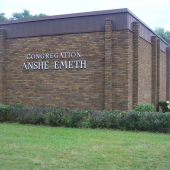Rabbi's Message
The Chosen People—A Misunderstood Concept
A Shavuot Thought
In the now-classic Broadway play "Fiddler on the Roof," portraying the beleaguered life of the Jews in a poor village in Czarist Russia, the milkman Tevye agonizingly looks up to the heavens and sighs: "Dear God, I know we're the chosen people ... but couldn't you choose somebody else sometime?" While this is a humorous line, it mentions a prominent concept worth looking at - the designation of the Jews as the "Chosen People." What exactly does this mean?
Actually, this is one of the most misunderstood Jewish theological principles. And because it has been misinterpreted as though Jews in some way are claiming religious superiority, it has given rise to virulent antisemitism in history. Indeed, sensitive to this danger, there have been some very important Jewish theologians who opposed this idea of “chosenness” - most notably Baruch Spinoza of 17th century Amsterdam, and later Rabbi Mordecai Kaplan, founder of the Jewish Reconstructionist Movement in the early Twentieth Century.
The fact of the matter is that the Chosen People concept has nothing to do with superiority, but rather a summons to responsibility in the world. When the Jewish People were gathered at the foot of the Mountain of Sinai, ready to receive the Torah, The Law, God told them: "Now, therefore, if you will hearken to my voice and keep my covenant, then you shall be Mine own treasure from among all peoples ... and you shall be unto me a kingdom of priests and a holy nation." (Exodus 19:56) And, later, this divine call was amplified through the prophet Isaiah's words: "I the Lord have called you ... to be a light unto the nations." (Isaiah 42:6).
Thus, the Jewish People were, yes, chosen, but chosen for a monumental task: to do their utmost to bring the light of justice and decency, as written in the Torah, more into the world. To be “a light unto the nations." Sometimes Jews have fulfilled this, sometimes not. But, by and large, propelled by this summons, Jews have been disproportionately involved in many of the social action causes in our country.
We have been leaders in the Civil Rights movement, in union efforts on behalf of workers, in national education organizations and in equality for women in the workplace. They have felt Biblically "chosen" to do this sacred work. Perhaps the eminent British Jewish scholar, Claude G. Montefiore, commenting on the previous Exodus passage, said it most articulately: "The Jews, described as 'God's own treasure,' are God's instrument ... but their work is far greater than the instrument itself." And so, with a nod to the beloved Tevye the milkman, this is what our “chosenness” is all about.



